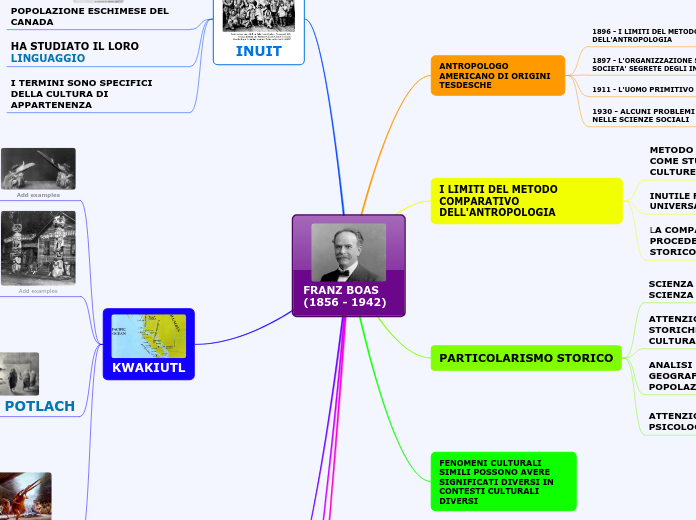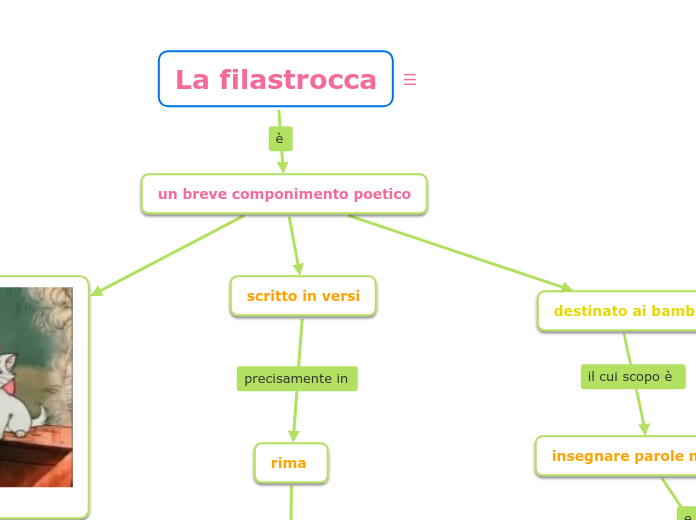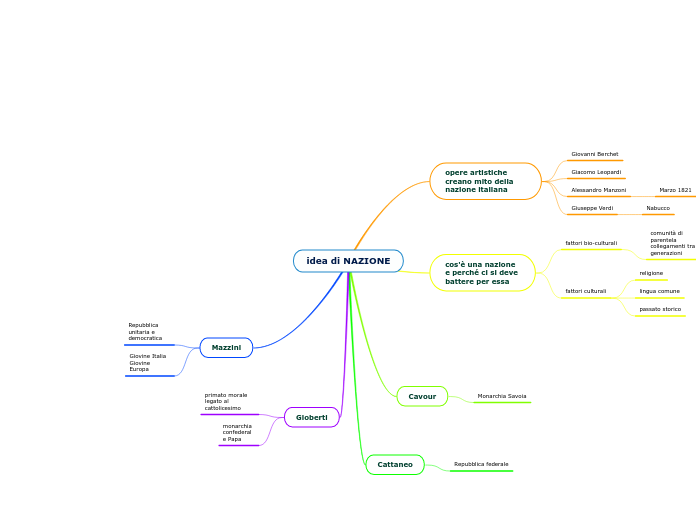FRANZ BOAS (1856 - 1942)
A noun is a word that functions as the name of some specific thing or set of things, such as living creatures, objects, places, actions, qualities, states of existence, or ideas.
ANTIDETERMINISMO
Countable nouns are nouns that can be counted, even if the number might be extraordinarily high.
Uncountable nouns are nouns that come in a state or quantity which is impossible to count; liquids are uncountable, as are things which act
like liquids.
RAZZIALE
GEOGRAFICO
1930: PROBLEMI DI
METODO NELLE SCIENZE SOCIALI
Proper nouns are the names of specific people or places. They should always begin with a capital letter.
RUOLO INDIVIDUALE
RIPRODUZIONE E MODIFICAZIONE DELLA CULTURA
(MODELLI SOCIALI DI COMPORTAMENTO)
LA CULTURA DEFINISCE LA REALTA' DI UNA SOCIETA'
RUOLO DELL'ANTROPOLOGO E' QUELLO DI AVVICINARSI ALLA RAPPRESENTAZIONE DEI MEMBRI DI QUELLA SOCIETA'
RAPPORTO PROCESSI PSICOLOGICI-CULTURA
1911: L'UOMO PRIMITIVO
A concrete noun is a noun that can be identified through one of the five senses (taste, touch, sight, hearing, smell).
ADATTAMENTO DEI PROCESSI MENTALI ALLA CULTURA E A CIO' CHE IN ESSA E' CONSIDERATO IMPORTANTE
ASSENZA DI DIFFERENZE
NELL'ORGANIZZAZIONE DELLA MENTE
ASSENZA DI RELAZIONE
TRA RAZZA E CULTURA
KWAKIUTL
Possessive nouns are nouns which possess something, normally another noun.
DANZA HAMATSA
SI RACCONTA DI UNO SPIRITO CHE RAPISCE LO SCIAMANO, LO POSSIEDE E POI AVVIENE UNA RESURREZIONE.
RITO DEL POTLACH
MANTIENE L'ORGANIZZAZIONE DEI RANGHI - LA SUA UTILITA' CONSISTE NEL FAR SI' CHE NESSUNO POSSA SENTIRSI SUPERIORE ALL'ALTRO
ECONOMIA DEL DONO VERSO CHI HA MENO - ONORE E PRESTIGIO BASATO SULLA GENEROSITA'
TEORIA RIPRESA DA MARCEL MAUSS
DONO DI BENI DI PRESTIGIO - DISTRIBUZIONE E DISTRUZIONE DI GRANDI QUANTITA' DI BENI TRA INDIVIDUI DELLO STESSO RANGO SOCIALE
POPOLAZIONE DEL NORD AMERICA
Add examples
INUIT
I TERMINI SONO SPECIFICI
DELLA CULTURA DI APPARTENENZA
HA STUDIATO IL LORO LINGUAGGIO
POPOLAZIONE ESCHIMESE DEL CANADA
FENOMENI CULTURALI SIMILI POSSONO AVERE SIGNIFICATI DIVERSI IN CONTESTI CULTURALI DIVERSI
Common nouns are words for people, places or things that aren’t specific (as opposed to a proper noun which refers to only one person, place or thing).
Common nouns can be countable or uncountable, singular or plural.
PARTICOLARISMO STORICO
A noun which refers to a group of things/people.
ATTENZIONE AI PROCESSI PSICOLOGICI
MODI SOGGETTIVI DI INTERAGIRE CON LA CULTURA
ANALISI DELLA DISTRIBUZIONE GEOGRAFICA PRESSO POPOLAZIONI LIMITROFE
ATTENZIONE ALLE CAUSE STORICHE SPECIFICHE DI UNA CULTURA
SCIENZA IDIOGRAFICA VS SCIENZA NOMOTETICA
I LIMITI DEL METODO COMPARATIVO DELL'ANTROPOLOGIA
A noun which cannot be identified by using one of the five senses (taste, touch, sight, hearing, smell).
LA COMPARAZIONE PUO' PROCEDERE SOLO DAL METODO STORICO
INUTILE RICERCA DELLA STORIA UNIVERSALE
METODO STORICO - ETNOGRAFIA COME STUDIO DI SINGOLE CULTURE
ANTROPOLOGO AMERICANO DI ORIGINI TESDESCHE
Irregular nouns are nouns which don’t follow a spelling pattern when pluralized.
1930 - ALCUNI PROBLEMI DI METODO NELLE SCIENZE SOCIALI
1911 - L'UOMO PRIMITIVO
1897 - L'ORGANIZZAZIONE SOCIALE E LE SOCIETA' SEGRETE DEGLI INDIANI KWAKIUTL
1896 - I LIMITI DEL METODO COMPARATIVO DELL'ANTROPOLOGIA









